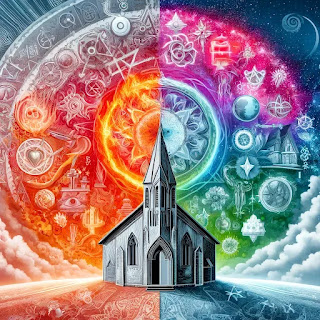How Did the West Fall for Pseudo-Religions?
The term "pseudo-religion" often carries a pejorative connotation, implying belief systems that mimic the structure and function of traditional religions without their spiritual authenticity or depth. These systems, ranging from secular ideologies to esoteric spiritual practices, offer adherents a sense of purpose and meaning but are fundamentally different from established religious traditions. They often lack the theological, moral, and communal frameworks that have historically been central to organized religions like Christianity.
This shift can be traced back to pivotal historical events, such as the Enlightenment and the Reformation. These movements challenged the authority of the Church and promoted individual reason and empirical science, leading to a gradual secularization of society. Over time, this secularization has led to what some scholars describe as a "spiritual void," where traditional religious narratives no longer hold the same sway over people's lives.
Charles Taylor's concept of a "spiritual supernova" provides a useful framework for understanding this transformation. He argues that rather than a simple void, what we witness today is a rapid proliferation of diverse spiritualities and belief systems. This "galloping pluralism" has seen the rise of new-age movements, self-help philosophies, and the quasi-religious reverence of technology and science. Each of these offers a different path to meaning and fulfillment but often lacks the grounding provided by traditional religions.
The reverence for technology, for instance, reflects a modern form of pseudo-religion. The Silicon Valley ethos, which views technological progress as a means to achieve control, immortality, and even a form of digital salvation, echoes religious aspirations for transcendence and eternal life. Figures like Ray Kurzweil, who speak of creating "God-like" artificial intelligences, demonstrate how deeply ingrained these technological pseudo-religious ideas have become.
Similarly, the allure of occult practices and Eastern philosophies speaks to a broader search for spiritual meaning. In a post-Christian context, many Westerners turn to practices like astrology, meditation, and various forms of mysticism. These practices promise personal transformation and spiritual enlightenment but can lead to what some critics describe as "false enchantments." Without the ethical and theological guardrails of traditional religions, these practices can become a double-edged sword, offering spiritual fulfillment on the surface while leading to potential psychological and spiritual harm.
The dangers of pseudo-religions are not merely theoretical. There is a real risk that in the absence of a coherent moral framework, individuals may become susceptible to spiritual deception and exploitation. The rise of online communities, such as "witch talk" on TikTok, illustrates how easily spiritual curiosity can be commodified and transformed into a performative spectacle, often divorced from any genuine spiritual depth or understanding.
The broader cultural implications of this shift are profound. As the West moves further away from its Christian roots, the ethical and moral consensus that once underpinned society becomes increasingly fragmented. This fragmentation can lead to a sense of moral and spiritual chaos, where individuals struggle to find meaning and purpose in a world that offers an overwhelming array of competing spiritual and ideological narratives.
In this context, the resurgence of interest in mysticism and traditional religious practices among some segments of the population can be seen as a reaction against the perceived emptiness of modern pseudo-religions. The appeal of more "authentic" spiritual experiences, whether through traditional Christianity, Islam, or other established religions, reflects a longing for deeper, more meaningful connections with the divine.
Ultimately, the West's dalliance with pseudo-religions raises critical questions about the future of spirituality and religion in a secular age. Can these new spiritual frameworks provide the depth and guidance that traditional religions once offered? Or are they merely temporary fixes, destined to be replaced by the next spiritual trend? As society continues to grapple with these questions, it remains to be seen whether the search for meaning will lead to a genuine spiritual renaissance or a deeper descent into spiritual fragmentation and disillusionment.



Comments
Post a Comment